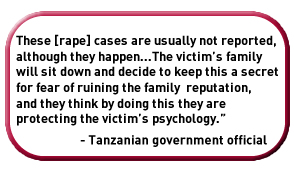
The war at home: suffering in silence
Media Contact
Asha* is a young, unmarried Tanzanian woman. She is also a rape survivor. But she had told no one about that violent encounter, a truth she carries with her every day.
She’s not alone. Sexual violence affects approximately 20 percent of women in Tanzania, however most don’t speak up about their experience. That’s true for Asha, too. She is scared into silence, crippled by the belief that the stigma and shame she would endure if she reported the rape would come at too great a cost to herself and her family. It’s an all too common reality here for survivors of sexual violence.
I learned about the experiences of Tanzanian women like Asha in a recent study my colleague Jennifer McCleary-Sills and I conducted to better understand the various pathways survivors of gender-based violence follow to seek help – as well as the barriers they face along the way. We collaborated on the study with researchers from the University of Dar es Salaam, as part of EngenderHealth’s CHAMPION Project.
To fully understand Asha’s legitimate fear of stigma, it is important to note that she is unmarried. For nearly all of the women we spoke with, forced sex within marriage is not considered to be rape, but rather something to be “tolerated” as a “marital issue.” Forced sex committed outside of marriage is another matter—community men and women agree in defining such an act as rape, and an unacceptable form of sexual violence.
 While such acknowledgment is important, it is not sufficient to ensure that survivors like Asha will come forward and ask for the help they desperately need. This is primarily because reporting rape is associated with shame and discrimination. In this context, a woman like Asha will often decide to remain silent, knowing that if she speaks out, she will likely not be believed, or may even be blamed for the violence. The stigma and blame will come from her family and her community. It will even come from the healthcare providers and police officers who are supposed to provide care and help bring her perpetrator to justice.
While such acknowledgment is important, it is not sufficient to ensure that survivors like Asha will come forward and ask for the help they desperately need. This is primarily because reporting rape is associated with shame and discrimination. In this context, a woman like Asha will often decide to remain silent, knowing that if she speaks out, she will likely not be believed, or may even be blamed for the violence. The stigma and blame will come from her family and her community. It will even come from the healthcare providers and police officers who are supposed to provide care and help bring her perpetrator to justice.
Asha’s experience is not unique; our research underscores that unless sexual violence is perpetrated against a child, as part of a gang rape, or results in serious physical injuries, a survivor is extremely limited in the support she receives and unlikely to report the crime. “Rape cases of women of our age are only considered when you have been raped by three or more people,” one young woman explained to us during a focus group discussion. “If it is only one person they will say we had an agreement, and they won’t do a thing.”
Only once survivors are no longer blamed for “inviting” rape will women speak out, report acts of sexual violence and seek the help they need to begin to heal, along with their families and their communities.
Our team has put forward a set of recommendations to help create an environment that encourages women like Asha to seek help, as well as to ensure that survivors are treated with the dignity and respect they deserve. We propose several approaches to address sexual violence-related stigma and other barriers to support in Tanzania. One of our recommendations, for instance, is to develop specific training for health care providers on sexual violence treatment that challenges the blame often placed on survivors and promotes more supportive attitudes toward them.
With this and other guidance, local stakeholders can develop concrete plans to address the culture of silence and develop a climate where Asha and millions of other Tanzanian women are able to speak out against violence.
*Asha is a composite fictional character who represents many of the women we heard about during our research.
New research:The upcoming paper, “Help-seeking Pathways and Barriers for Survivors of Gender-based Violence in Tanzania: Results from a Study in Dar es Salaam, Mbeya, and Iringa Regions,” summarizes the author’s findings and will be available in the coming weeks.
The series:This is the final piece in “The War at Home,” a series of blogs about violence against women that will be featured throughout the 16 Days of Activism Against Gender-based Violence, which runs Nov. 25 through Dec. 10. Read the previous blogs in the series, Enduring Evidence and Uncharted Territory.
